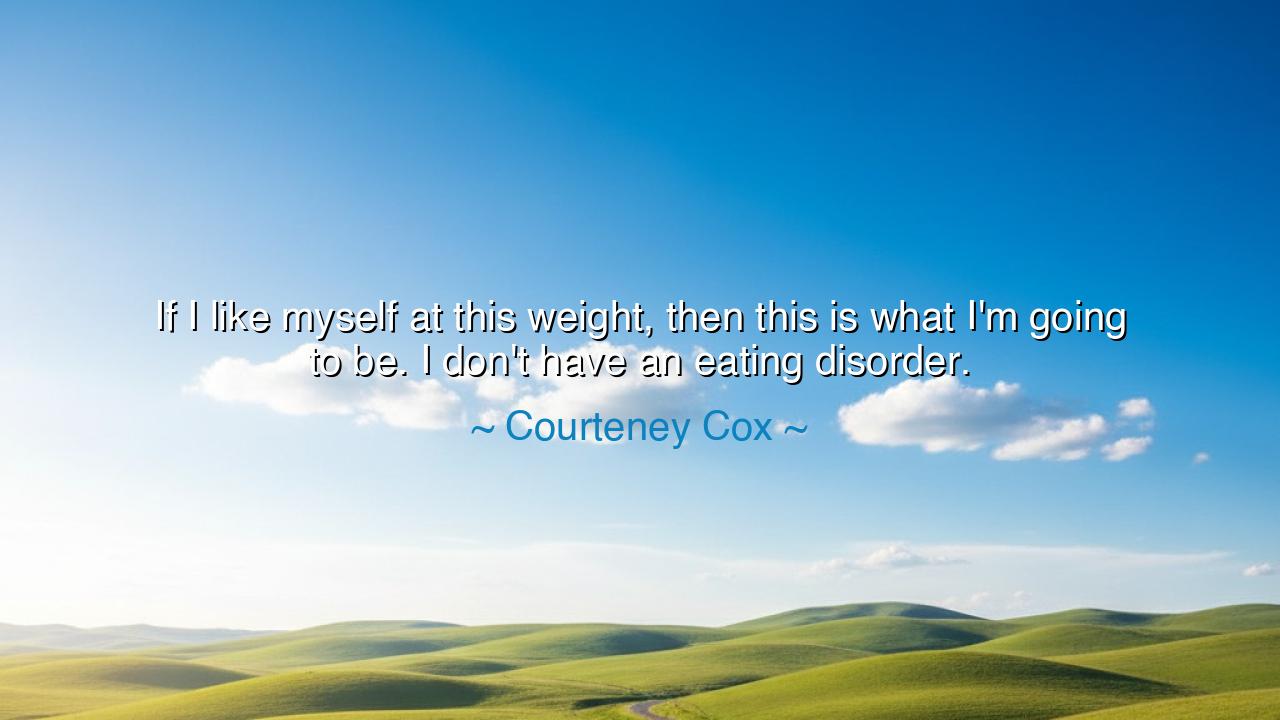
If I like myself at this weight, then this is what I'm going to
If I like myself at this weight, then this is what I'm going to be. I don't have an eating disorder.






When Courteney Cox said, “If I like myself at this weight, then this is what I’m going to be. I don’t have an eating disorder,” she was speaking not from vanity, but from liberation — the freedom of one who has ceased to measure her worth through the eyes of others. Her words are a declaration of peace after a long war, the quiet triumph of self-acceptance over the endless noise of judgment. In a world that worships perfection yet breeds insecurity, her statement shines like a small but steadfast flame — a reminder that true beauty arises not from compliance, but from contentment.
Her message carries ancient echoes. The sages of old, from Greece to India, spoke often of balance — the harmony between body and spirit. The philosopher Epictetus taught that freedom is not the absence of hardship, but mastery over one’s own thoughts. So too does Courteney’s declaration reveal mastery: she no longer bends to the tyranny of external ideals. By saying “If I like myself at this weight,” she draws her strength from within, defining beauty not by measure or standard, but by self-knowledge and dignity. In her acceptance, there is wisdom; in her calm defiance, there is power.
There was once an Athenian sculptor who sought to carve the perfect statue of a woman. He measured every curve, studied every face, adjusted every line — and yet his creation, though flawless in form, lacked soul. One day, he encountered a shepherd’s daughter whose laughter carried warmth and serenity, whose face bore the natural glow of self-love. In that moment, he understood: perfection is lifeless without authenticity. Courteney’s words remind us of the same truth — that the soul’s ease shines brighter than the body’s precision, and that to love oneself is the truest form of art.
In her statement, there is also a subtle rebellion against the culture of obsession — a world that counts calories instead of blessings, measures pounds instead of peace. By rejecting this, she does not renounce health or discipline, but the fear that often disguises itself as control. Her voice joins that of countless others who have sought to reclaim the body from judgment and reclaim joy from shame. Like the warrior who lays down her sword after many battles, she stands unarmed, yet undefeated — for she has learned that strength is not in restraint, but in reconciliation.
Her declaration — “I don’t have an eating disorder” — is not a dismissal of struggle, but an affirmation of balance. It is the voice of one who has faced the mirror and made peace with it. The ancients would have called this temperance, the golden mean between indulgence and denial. Courteney does not glorify excess, nor does she worship deprivation. She simply honors her body as it is — the vessel of her life, her art, her laughter. In doing so, she teaches that wellness is not achieved through punishment, but through presence — the quiet awareness of what the body needs, and the grace to accept it.
Her wisdom finds kinship in the story of Queen Hatshepsut of Egypt, who defied convention and ruled not by imitation but by authenticity. Though surrounded by expectations of how a ruler — and a woman — should appear, she stood firm in her own identity, shaping her image as both king and queen, man and woman. Her reign endured because it was rooted in self-belief. Like Hatshepsut, Courteney’s strength is self-fashioned — unshaken by others’ measures, grounded in her own truth. To know oneself and to like oneself is the highest form of sovereignty.
So, my listener, take this teaching to heart: you owe the world no apology for loving yourself as you are. The measure of your worth does not lie in numbers or mirrors, but in the peace that dwells within. Care for your body, yes, but let care spring from reverence, not rejection. Eat with joy, move with grace, and rest with gratitude. And if ever the world tells you that you are too much or not enough, remember Courteney’s words — the ancient truth renewed: If you like yourself, then you are already whole.
Thus, the lesson stands eternal — self-acceptance is not surrender; it is awakening. When you cease to chase perfection, you begin to embody it. When you embrace your reflection, the world itself begins to shine brighter, for it mirrors the calm and courage of one who has made peace with their own being.






AAdministratorAdministrator
Welcome, honored guests. Please leave a comment, we will respond soon